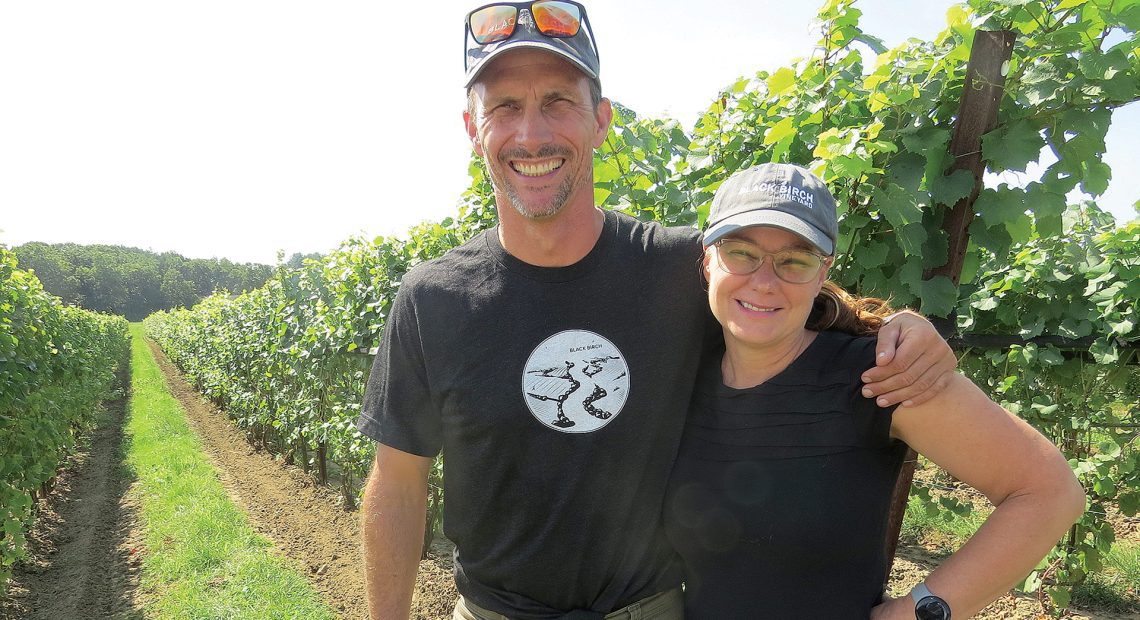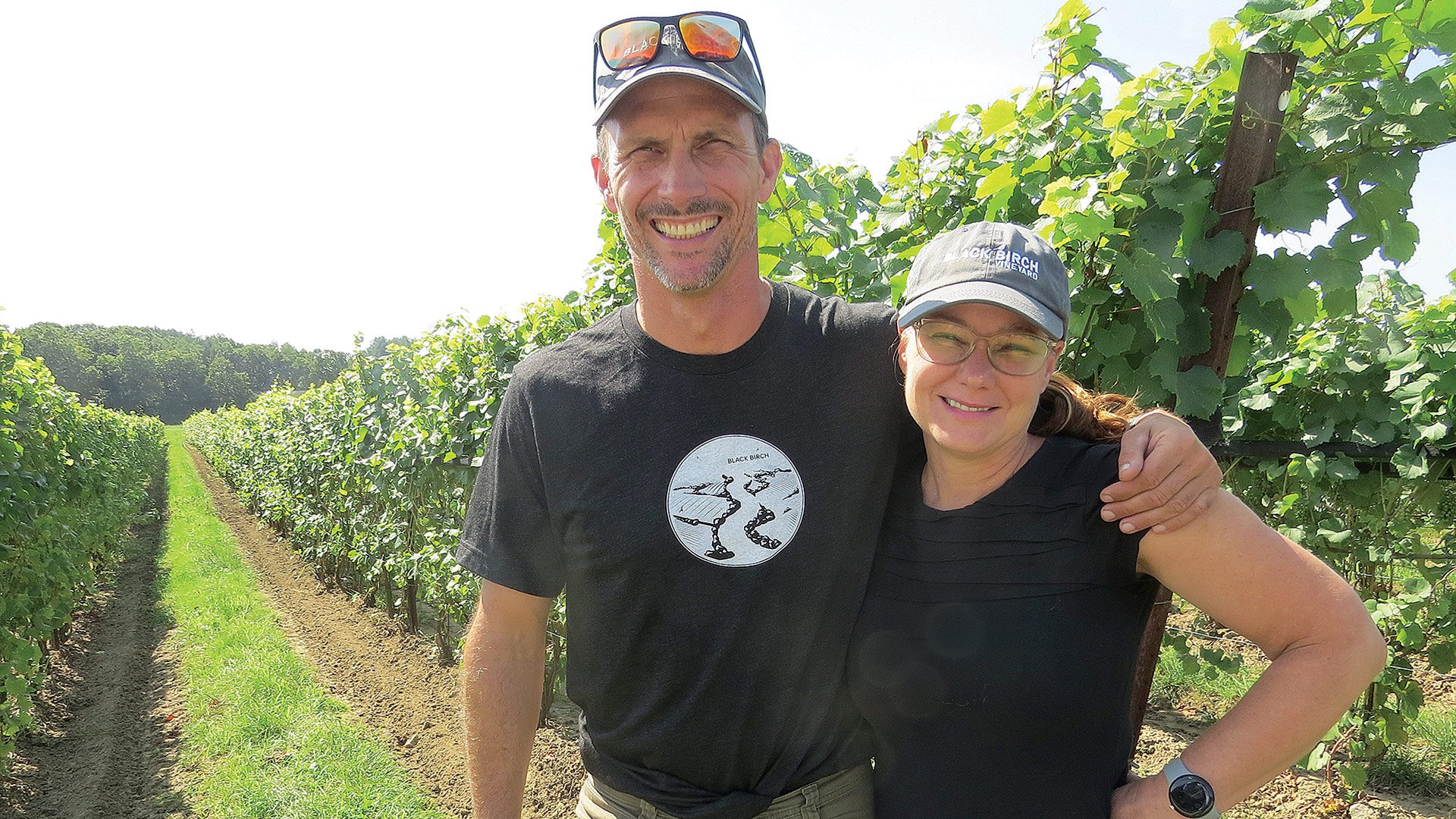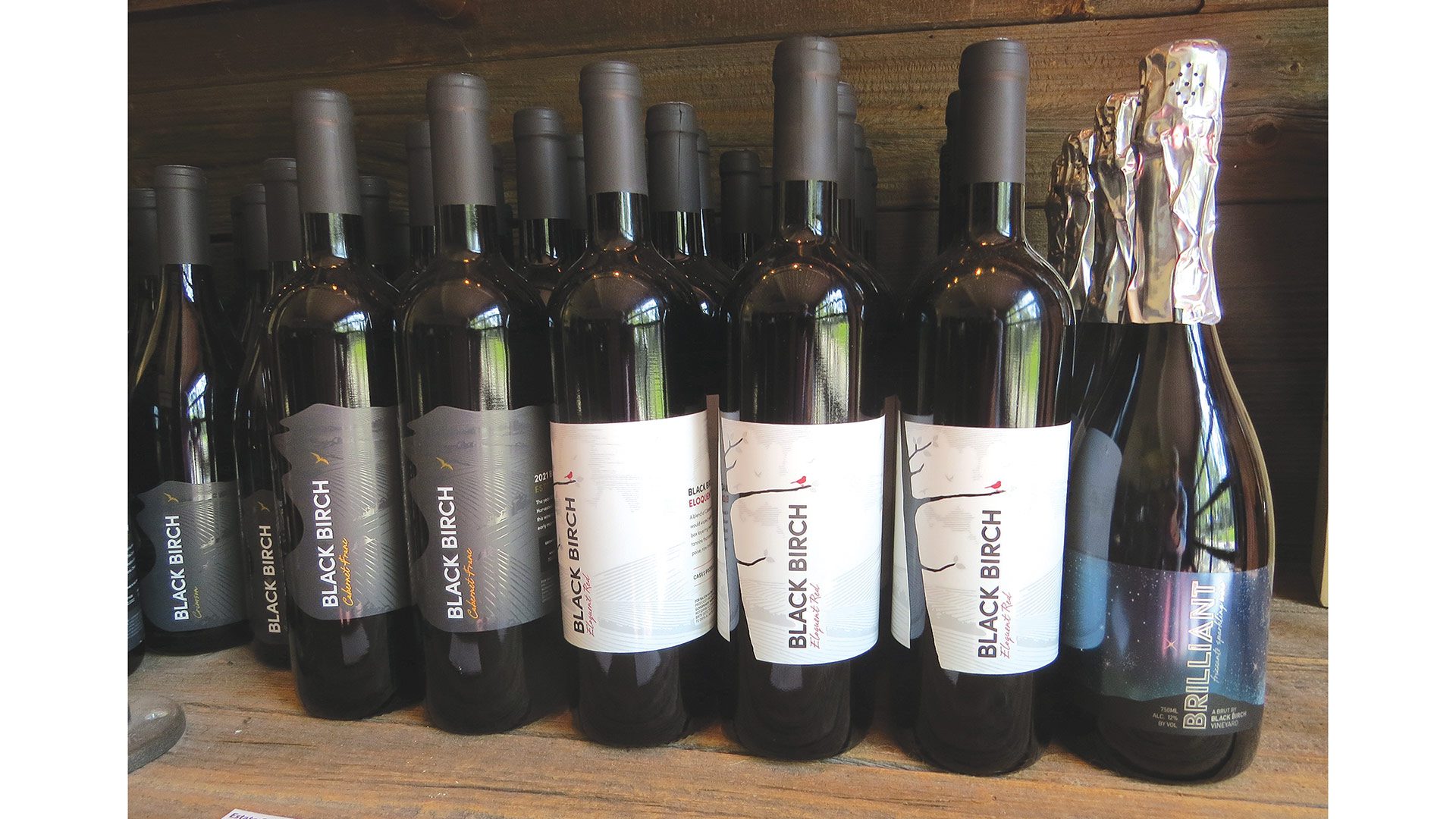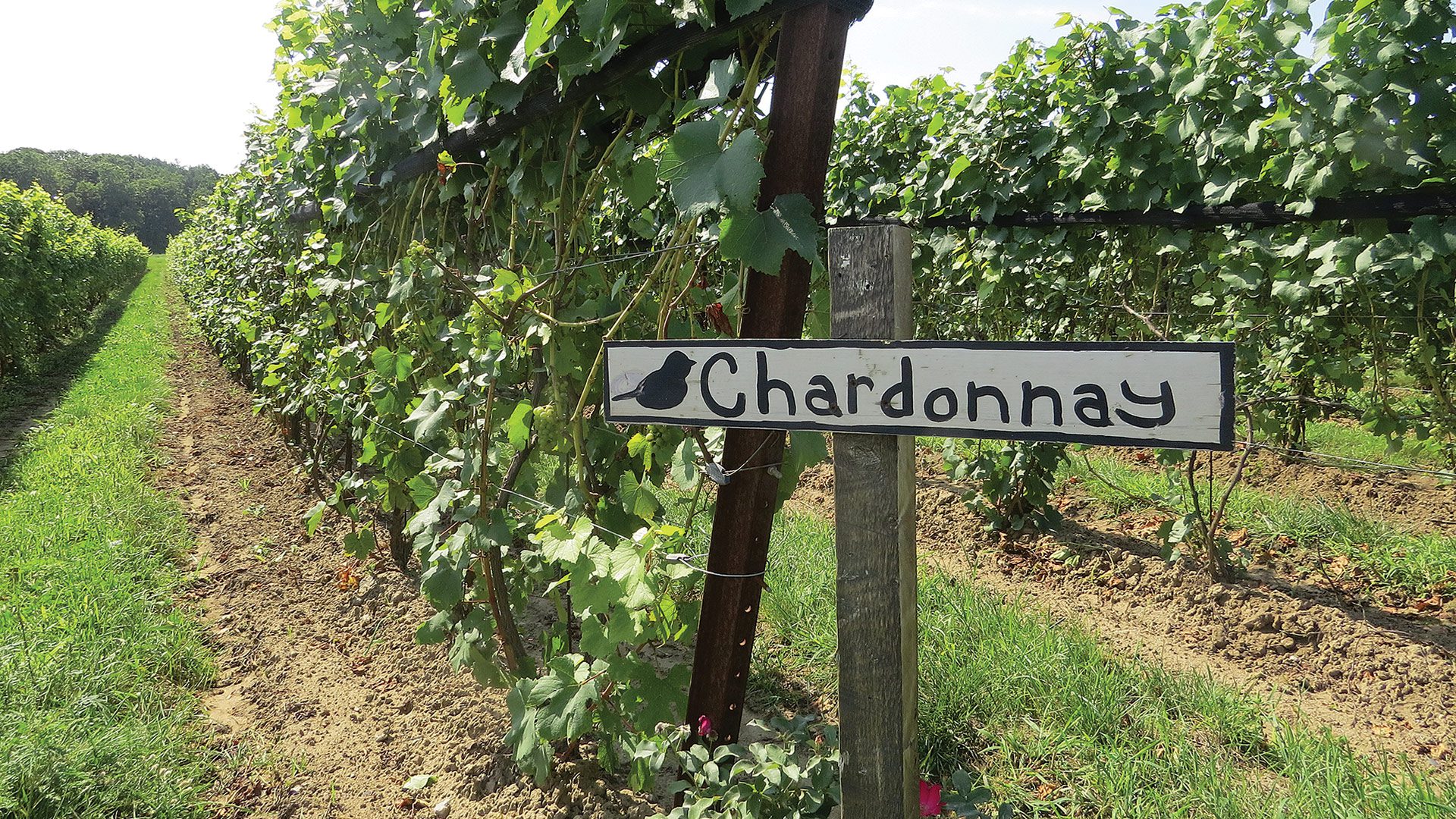
Black Birch Vineyard Continues to Branch Out
Vine Tuned

Ian Modestow and Michelle Kersberger have orchestrated steady growth at Black Birch Vineyard since launching the Hatfield operation in 2017.
There are not many companies that can say that the pandemic was “probably the best thing that could have happened to us.”
But that’s the phrase Michelle Kersberger summoned as she talked about those unprecedented times. And this was not hyperbole.
Indeed, while the start of the pandemic was a difficult, scary time, to say the least — Kersberger would load up her car and make deliveries to wine-club members just to bring in some much-needed revenue — by late in that summer of 2020, COVID-19 had played a major role in putting the hidden gem that was Black Birch Vineyard on the proverbial map.
“By the time August came around, we had to stop people from coming in,” she said, adding that the winery moved all its operations outdoors, and area residents starved for things to do found several at Black Birch.
“The pandemic was pandemonium. It was crazy here … people were coming from everywhere,” said Ian Modestow, Kersberger’s husband and business partner in this venture, recalling that there were COVID-related restrictions on how many people could be seated outdoors at the winery at any given time, and on more than a few occasions, he had to park his tractor at the top of the long driveway off Straits Road in Hatfield to keep more vehicles from venturing down that gravel path.
“We worked our butts off, our staff worked their butts off … we had too many people coming in, and we had to turn some away.”
Looking back on those days, Ian and Michelle said they were essentially rolling with the punches and making the very best of the opportunities that presented themselves, an MO that has defined Black Birch since they settled into this former onion farm in 2017 after selling off their share of a similar venture in Southampton.
Those opportunities range from the staging of concerts during the summer months — a tradition born from COVID, in many respects — to hosting a wide variety of events in the tasting room, to selling wool and meat generated from the 40 or so sheep that now populate this beautiful real estate.
Things have settled down a little from those crazy days of the pandemic, but business remains steady at Black Birch, and, increasingly, it is now year-round, as we’ll see.
The main businesses are growing grapes and making wine, and Black Birch now produces several different labels, from its Epic White, made from Vidal Blanc grapes, to Eloquent Red, a blend of Cabernet Franc, Blaufrankisch, and Marquette. They come in two distinct labels, white for the ‘heritage’ wines made with grapes purchased from outside growers, and black for the estate wines made with grapes grown on site in Hatfield.
This theme of rolling with the punches continues in 2023, a difficult year due to different types of extreme weather — first a killing frost that destroyed 80% of the grapes planted in May, and then incessant summer rains that will certainly impact the 20% that survived, said Modestow, noting that grapes like it dry and hot, and there simply hasn’t been a lot of that lately.
Fortunately, 2021 and 2022 were boom years for this venture, Kersberger said, adding that they have provided a cushion of sorts from the problems of this spring and summer, although the damage done by Mother Nature will certainly take a toll.

Black Birch now offers a wide array of wines featuring both its ‘heritage’ and ‘estate’ labels.
Overall, the business plan calls for moving toward producing all wines with grapes produced on site, said Modestow, adding that they’re roughly halfway to that goal, while also growing each of the various operations within this venture, from the events to the sheep’s wool.
For this issue and its focus on wineries and breweries, BusinessWest paid a visit to Black Birch to learn about how a hobby turned into a business … and a passion.
Grape Expectations
As they talked about their venture, Modestow and Kersberger were joined first by sibling cats Chardonnay, or ‘Chard’ for short, and Pinot, and later by Burmese mountain dogs Yogi and Simka, who have become part of the team, if you will, at Black Birch, a vision that first started coming into focus when the two business owners met while attending UMass Amherst in the mid-’90s.
Later, during their college journey, they traveled to the Netherlands to visit some of Kersberger’s family and took a side trip to the Loire Valley in France, famous for its wine production.
“We have a lot of repeat customers, and those customers bring new customers, and it grows from there; there’s a lot of word-of-mouth advertising.”
“Being poor college students, we had to camp, and we would camp at farms, and many of them were vineyards — mom-and-pop operations,” she explained. “It sparked our interest, and any time we traveled after that, we always made sure we visited any vineyards or wineries in the region, and our love of the culture grew from there. Everything about wine and winemaking and the community and the social aspect of it … it was always a draw for us.”
Modestow concurred. “When we traveled, we went to wine-growing areas — Burgundy, Champagne, California, Washington, Spain, even Canada and Texas.”
This interest, and burgeoning passion for wine and making wine, stayed with them as they lived in Amsterdam for a year while Ian attended school there for archaeology, and later, as they started their professional careers, with Modestow launching a dental practice in Northampton and Kersberger essentially managing that practice.
In 2011, this interest in wine started morphing into a business, with Modestow and Kersberger partnering with Mary and Ed Hamel in a venture that would become Black Birch Vineyard in Southampton. In the spring of 2017, they would take that name and their experience, equipment, and burgeoning entrepreneurial spirit to a former onion farm in Hatfield and put down some roots — figuratively, but also quite literally.
Indeed, they would move twice in two months, first to a storage facility and then to the farm in Hatfield, and eventually plant more than 12 acres with roughly 19,000 vines of several different cool-climate varietals, from Chardonnay to Riesling; Pinot Noir to Trominette. They also opened a tasting room (a transformed former onion barn) and launched a wine club.

Black Birch Vineyard
Over time, Modestow would ease out of his dental practice — he is now all but officially retired from that profession — and he and Kersberger would make wine and winemaking a full-time pursuit.
They were gradually gaining some traction, and a following, for their wines, when the pandemic put them on a faster, more vibrant track. As noted earlier, it didn’t happen overnight; the first few months of the pandemic were quite scary indeed as both Black Birch and the dental practice shut down, leaving no revenue coming in.
But as area residents starting looking for things they could do, the Black Birch team saw opportunities as they moved many functions outside and kicked off their summer music series with artists who were looking for, and desperate for, places to play their music.
“We were able to open up, pivot what we were doing, and make everything work,” Kersberger recalled. “We worked our butts off, our staff worked their butts off … we had too many people coming in, and we had to turn some away.”
Those who did manage to get down that long driveway apparently enjoyed their experience, she went on, noting that there have been large numbers of repeat customers coming to Black Birch, enough to make 2021 and 2022 “banner years” for the operation.
“People have been coming back,” she said. “Maybe not as often, but they’re coming back; we really got our name out there.”
Indeed, Black Birch has settled into a groove, if you will, with its recently concluded summer concert series routinely drawing more than 200 visitors; the tasting room seeing business year-round; the facility hosting a wide array of events, from birthday parties to wedding-rehearsal parties; and the sheep generating various forms of business while also grazing the spaces between the rows of vines and providing fertilizer for the vineyard.
And what used to a two- or three-season business is now a year-round venture.
“Things have changed over the past two or three years,” Modestow said. “We’ve gone from winters being dead to winters actually being quite steady.”
Kersberger agreed, noting that the vineyard and winery now draw visitors from up and down the I-91 corridor and beyond, including Connecticut, Vermont, New York, and all across Western Mass., while also welcoming students from UMass and the other Five Colleges institutions — who are more into wine those of a generation or two ago — as well as their parents and friends.
“A huge portion of our customers are from this area,” Kersberger said. “We have a lot of repeat customers, and those customers bring new customers, and it grows from there; there’s a lot of word-of-mouth advertising.”
Bottom Line
Getting back to the business plan and the broad goal of producing only wines with those black ‘estate’ labels, Modestow said the extreme weather of 2023 has certainly set those plans back.
On one fateful night in May, the temperature dropped to 25 degrees, killing 80% of the crop at Black Birch.
The full impact of this setback won’t be known for some time, he said, but given the growing demand for Black Birch wines, the damages will certainly increase both dependence on grapes grown elsewhere and reliance on what remains in inventory from previous years.
Meanwhile, after those banner years of 2021 and 2022, when growth was “off the charts,” Kersberger said, projections are for steady, if not as spectacular, growth moving forward.
In short, those at Black Birch will do more rolling with the punches — and the weather.
That has been standard operating procedure since the first vines were planted back in May 2017, and this mindset has enabled a business — and a passion — to take root and bear fruit, both literally and figuratively.





